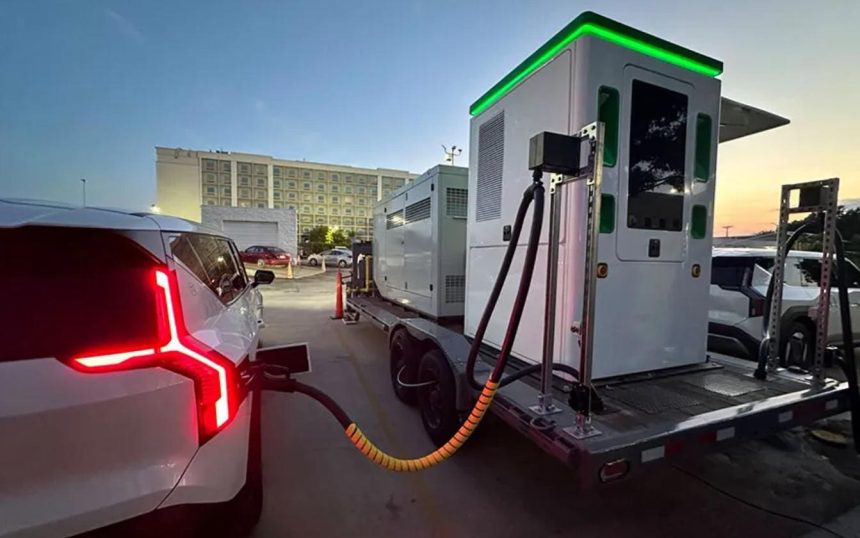Alto, a rideshare platform committed to transitioning its fleet to electric vehicles, faces a significant hurdle: ensuring its EVs stay charged and on the road. The existing power grid infrastructure often proves inadequate or too slow to develop, hindering the seamless operation of a fully electric fleet. To address this challenge, Alto has partnered with L-Charge, a company offering a charge-as-a-service (CaaS) solution. L-Charge provides mobile charging stations housed in trailers, effectively bringing the power source directly to Alto’s vehicles. This innovative approach bypasses the limitations of traditional grid infrastructure, offering a flexible and readily available charging solution. The partnership highlights the growing need for adaptable charging solutions in the face of evolving transportation needs and the limitations of existing infrastructure.
L-Charge’s mobile charging units utilize natural gas, both traditional and synthetic, to generate power. Each unit houses a 180kW charger equipped with two charging guns, offering flexible charging options. The system can deliver 90kW simultaneously to two vehicles or provide ultra-fast 180kW charging to a single vehicle. This flexibility caters to varying charging demands and optimizes charging times for Alto’s fleet. L-Charge’s model eliminates upfront costs and fees, with customers paying only for the power consumed. This pay-per-use model simplifies budgeting and cost management for Alto, allowing them to focus on operational efficiency rather than infrastructure investment. The mobile nature of the units also allows for easy relocation, providing charging support wherever Alto expands its operations.
For Alto, the primary benefit of partnering with L-Charge is the speed and availability of charging solutions. Securing permanent charging infrastructure can be a lengthy process, often involving bureaucratic hurdles and lengthy construction timelines. L-Charge’s mobile units can be deployed rapidly, providing a much-needed interim solution while permanent infrastructure is developed. This agility is crucial for Alto, as downtime for charging translates directly to lost revenue. By minimizing charging time and maximizing vehicle availability, L-Charge’s solution contributes directly to Alto’s bottom line. While the cost per kilowatt-hour might not be significantly lower than grid power, the speed and convenience offered by L-Charge present a valuable trade-off.
The partnership between Alto and L-Charge underscores the broader challenge of scaling EV infrastructure to meet the growing demands of electric fleets. Across the globe, existing power grids struggle to keep pace with the rapid adoption of electric vehicles. This infrastructure gap necessitates innovative solutions like L-Charge’s mobile charging units. For Alto, a company that employs its drivers directly and owns its fleet, efficient charging is paramount. Idle time spent waiting for vehicles to charge represents a significant cost. L-Charge’s solution mitigates this cost by providing readily available charging, allowing drivers to remain productive and maximizing fleet utilization. Furthermore, the portability of L-Charge’s units aligns perfectly with Alto’s expansion plans, providing a readily deployable charging solution as they enter new markets.
The innovative approaches taken by companies like L-Charge highlight the evolving landscape of EV charging. Traditional fixed charging stations, while essential, may not always suffice, particularly for businesses with dynamic charging needs. The emergence of mobile and adaptable charging solutions like L-Charge’s provides a crucial bridge, ensuring that EV fleets can operate efficiently even in areas with limited charging infrastructure. Other companies are also exploring innovative charging solutions, including autonomous charging robots, retrofitted streetlights with charging ports, and modular direct current power generators using renewable energy sources. These diverse approaches demonstrate the ingenuity and adaptability required to overcome the challenges of widespread EV adoption.
While L-Charge currently serves as a primarily interim solution for Alto, its potential as a long-term solution in certain areas is undeniable. As Alto expands its operations, particularly into regions with underdeveloped charging infrastructure, L-Charge’s mobile units may become a permanent fixture. This adaptability is key to the continued growth of EV fleets, ensuring that charging limitations do not impede the transition to sustainable transportation. The partnership between Alto and L-Charge exemplifies a successful synergy between a forward-thinking rideshare company and an innovative charging provider. This collaboration showcases the potential of mobile charging solutions to address the pressing need for accessible and efficient EV charging, paving the way for a smoother transition to a fully electric transportation future.



